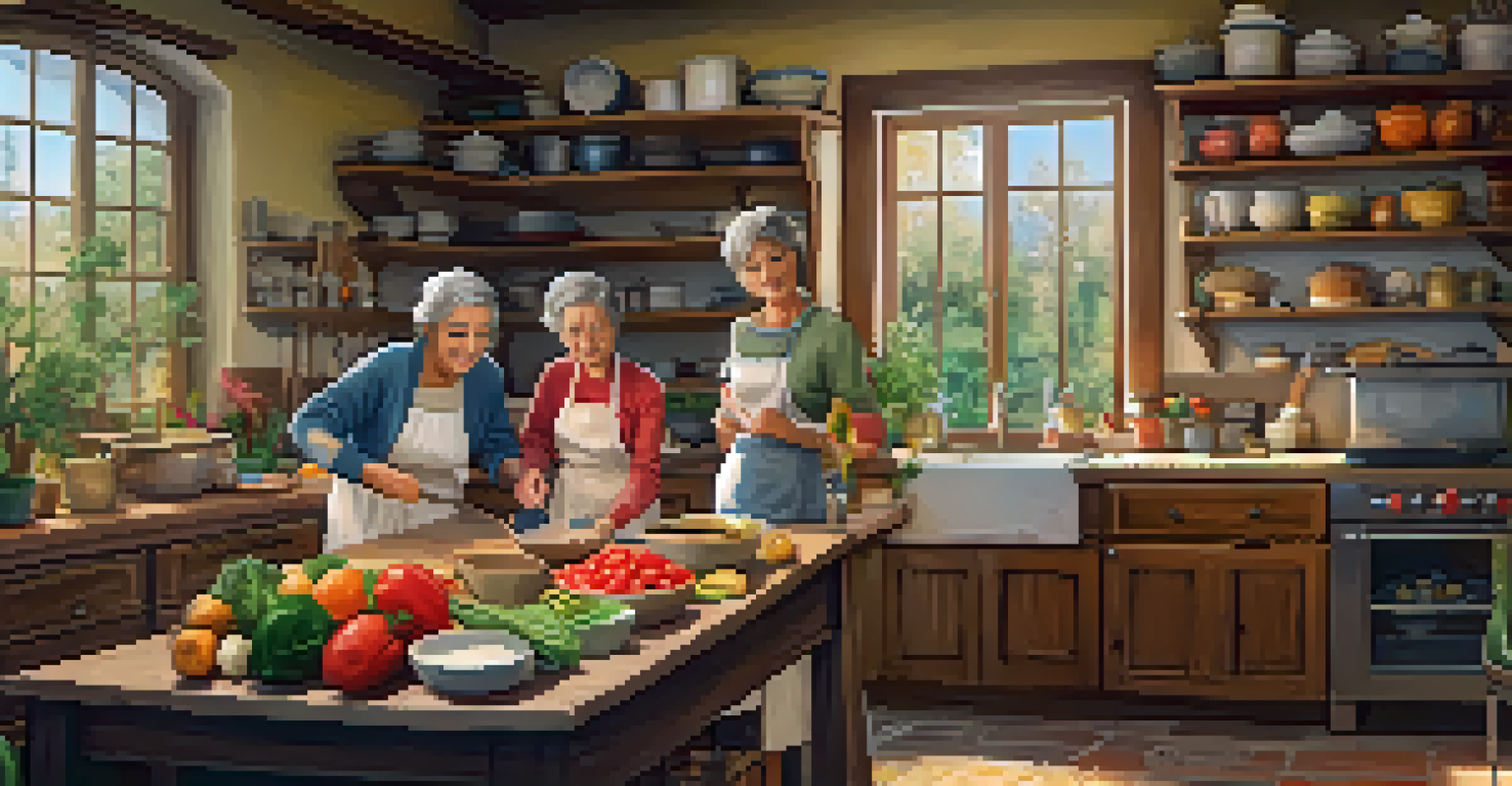The Importance of Family History in Multi-Generational Homes

What Are Multi-Generational Homes and Their Benefits?
Multi-generational homes are living arrangements where multiple generations of a family reside together. This setup can include grandparents, parents, children, and sometimes even extended family members like aunts and uncles. The benefits are numerous, from shared financial responsibilities to emotional support, creating a tightly-knit family unit.
Family is not an important thing, it's everything.
Living under one roof fosters stronger relationships and provides a built-in support system for everyone involved. For instance, grandparents can help with childcare, allowing parents to balance work and home life more effectively. This arrangement often leads to a richer family experience, where stories and traditions are passed down.
Additionally, multi-generational homes can combat loneliness and isolation, especially for older adults. Having family members nearby can enhance mental well-being and make it easier to navigate the challenges of aging, creating a vibrant atmosphere that celebrates family bonds.
The Role of Family History in Strengthening Bonds
Family history plays a vital role in fostering connections between generations. By understanding their roots, family members can appreciate shared experiences and values, which helps deepen relationships. When family stories are shared, it allows younger generations to feel a sense of belonging and pride.

For example, sitting around the dinner table and sharing stories about ancestors can spark conversations about family traditions, cultural heritage, and personal experiences. These narratives often create a sense of continuity and identity, reminding everyone of how their lives are interconnected.
Benefits of Multi-Generational Homes
Multi-generational homes enhance family bonds through shared responsibilities, support systems, and rich emotional connections.
Moreover, engaging with family history can lead to valuable life lessons passed down through generations. Whether it’s tales of resilience in tough times or examples of kindness and generosity, these stories can inspire and guide family members, enriching their lives.
Preserving Family Traditions Through Generations
Traditions are the threads that weave families together, and they often stem from family history. In multi-generational homes, these customs can be more easily preserved and passed down. Celebrating holidays, family gatherings, or even simple rituals can create lasting memories and a sense of unity.
The bond that links your true family is not one of blood, but of respect and joy in each other's life.
For instance, cooking family recipes together not only teaches younger generations about their heritage but also creates a fun and engaging activity. It’s in these moments that the past is alive, and the values associated with those traditions are instilled in younger family members.
Furthermore, maintaining these traditions fosters a sense of identity and belonging. When children learn about their family’s unique customs, they develop a deeper appreciation for their background, contributing to their self-esteem and confidence.
The Intergenerational Exchange of Knowledge
One of the unique advantages of multi-generational homes is the opportunity for an intergenerational exchange of knowledge. Older family members often possess a wealth of life experience and skills that can be shared with younger generations. This exchange can take many forms, from teaching practical skills to imparting wisdom about relationships and life challenges.
For example, a grandparent might teach their grandchild how to garden or fix a car, while sharing stories of their own childhood experiences. This not only provides valuable skills but also helps cultivate mutual respect and admiration between generations.
Importance of Family History
Understanding family history fosters deeper relationships and a sense of belonging among generations, enriching their lives.
Moreover, younger family members can introduce older generations to contemporary ideas and technologies. This bi-directional learning enriches everyone’s lives, fostering adaptability and understanding across age groups, ultimately strengthening family ties.
The Emotional Impact of Knowing Family History
Understanding family history can have profound emotional benefits for all ages. When family members learn about their ancestors' struggles and achievements, they often feel more grounded and connected to a larger narrative. This sense of belonging can significantly enhance emotional well-being, especially for younger individuals navigating their own identity.
For instance, knowing that a great-grandparent overcame significant obstacles can provide inspiration and resilience during personal challenges. These stories can be a source of strength, reminding family members that they come from a lineage of perseverance.
Additionally, sharing emotional stories can help bridge the gap between generations. It creates a safe space for vulnerability, allowing family members to express their feelings and share their experiences, further solidifying their bonds.
Challenges in Multi-Generational Homes and Family History
While multi-generational living has its many benefits, it also comes with challenges that can impact family history. Conflicts may arise due to differing lifestyles, values, or expectations, leading to misunderstandings. It's essential to address these issues openly and compassionately to maintain harmony within the household.
For example, differing opinions on parenting styles or household responsibilities can create tension. It's crucial to navigate these conversations with empathy and a willingness to understand each other's perspectives, fostering a respectful environment.
Creating a Family Legacy
Documenting family stories and traditions establishes a legacy that preserves heritage for future generations.
Furthermore, if family history is not actively shared, it may become diluted over time. Making a conscious effort to discuss and document family stories can help avoid losing valuable connections and ensure that future generations appreciate their heritage.
Creating a Family History Legacy for Future Generations
Establishing a family history legacy is an important aspect of living in a multi-generational home. By documenting stories, traditions, and important milestones, families can create a tangible record for future generations. This legacy can take various forms, from written memoirs to digital archives or even family trees.
For instance, organizing family reunions can be an excellent opportunity to gather stories and photos that celebrate everyone's contributions to the family narrative. These gatherings can help reinforce the importance of family history and encourage younger members to take an active interest in their heritage.

Ultimately, creating a legacy helps ensure that family history is preserved and cherished. It allows future generations to understand their roots and carry forward the values and traditions that define their family.